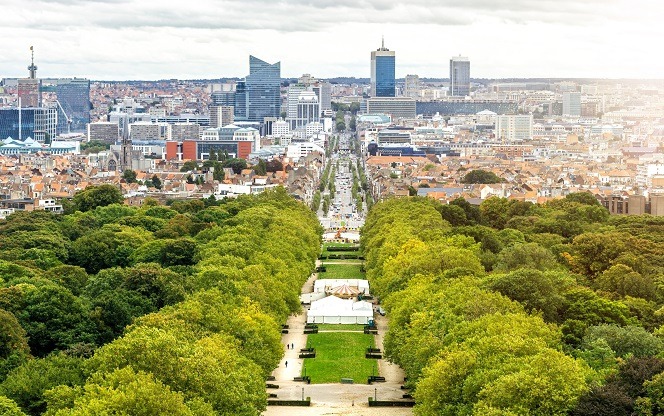Closed Circuit Television (CCTV) has become a booming business in Brussels. In 2009 there were 192 CCTV cameras in the Brussels region. Today we have 1,365 CCTV cameras plus 1,800 used by STIB in the metro stations. Recent research by the ULB published by the Brussels Institute concluded that the CCTV network is not helping to reduce crime.
In fact CCTV is a huge market worldwide, with nearly 15 billion dollar in revenue in 2013 and an expected growth rate of 18%. In Brussels it is a business in which millions of euro are spent. More than 16 million euro were spent to place 360 cameras in two police zones in Brussels. Europe also invests in cameras in Brussels through the Eurotop fund, to the tune of 20 million euro per year. It should be noted that these investments go from the state to private corporations.
As research of ULB shows the number of CCTV cameras is double the amount of cameras that have been registered. By law when one installs a CCTV camera, they must inform the Privacy Commission. Only half of the people did that. In fact the legal context for CCTV cameras in Belgium is contestable and is purposely left vague so that it can be exploited.
For example: on-board cameras and bodycams used by Brussels-North police do not comply with signage laws. Yet, despite a lack of legal compliance, police use them anyway, assuming a law will eventually be passed that allows such practices. Only in Belgium can such absurdities take place.
Figures also show that most of the CCTV cameras are placed in the city centre and poor neighbourhoods where people of migrant background live. These cameras support repressive policies. In Brussels the number of police officers, security agents and municipality stewards has been growing. Moreover, we have the army on the streets and experts have been employed on deradicalisation projects. Even schools and teachers have become part of the repressive structure, as they have to report when they notice “warning signs”.
In communes such as Molenbeek we have seen cuts in social services, while the local municipality has invested two million euro on cameras. National and international research has shown that these cameras do not help in fighting crime, as criminals simply shift their field of action to other areas. It is politicians that are the driving force behind the CCTV network. In fact research shows that police are less convinced about the effectiveness of the cameras, but since they don’t have to pay for them, they welcome such investments.
We have recently observed a worrying evolution: intercity competition for the highest concentration of cameras. The Brussels authorities were motivated by Paris, while the mayor of Antwerp was inspired by London’s CCTV network.
The mayor of Antwerp also wants to use them for the “war on drugs”. He wants to install as many cameras as possible around the city. All kinds of high-tech cameras, just like in London. The UK leads the world in CCTV networks. They have installed more than four million cameras: 1 per 14 inhabitants. In London, you’re filmed 300 times per day and 40% of the public space is under video surveillance. These millions of cameras cost a lot of money.
Already in the nineties, 78% of the UK’s budget for crime prevention was spent on the placement of cameras. Billions of euro have been invested during the last two decades. Mike Neville of Scotland Yard and responsible for the management of all these cameras, admitted that CCTV cameras in the UK have been a “complete failure”. The numbers speak for themselves: 0.1% of the crimes were solved by way of CCTV images. With risible figures like that, it is completely absurd investing in cameras.
Alternatively, those millions of euro could be invested in building schools or social housing in Brussels, as we have a huge shortage of both. They could be invested in creating jobs for the unemployed who are low skilled and have a low level of education. At the moment they have little chance of finding work, as such jobs are scarce. However, 80,000 of the 120,000 people without a job have low levels of education. This figure has been there for years and no government or political party has ever presented a plan to tackle this problem, which has undoubtedly been one of the biggest issues in Brussels for decades.
By Bleri Lleshi

